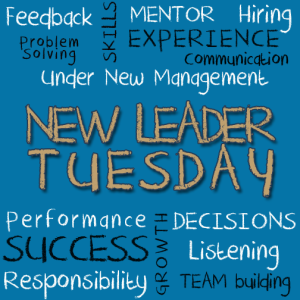 The New Leader Tuesday series is dedicated to helping first-time, early career and even experienced professionals with a “beginner’s mind” progress on their journey towards effective leadership.
The New Leader Tuesday series is dedicated to helping first-time, early career and even experienced professionals with a “beginner’s mind” progress on their journey towards effective leadership.
—
“I have no question that when you have a team, the possibility exists that it will generate magic, producing something extraordinary… But don’t count on it.” -J. Richard Hackman
The operative phrase in the late Dr. Hackman’s quote is, “But don’t count on it.”
Too often and with the best of intentions, we assemble a team of our best and brightest to tackle an important issue and then assuming our job is done and the task is in the hands of these capable people, we step away and wait for the results. And all too often, instead of something magical from our teams, what we get back looks and feels a lot like flailing heading towards failing.
Effective leaders understand the importance of coaching to team success, and they either remain involved in this capacity or, better yet, they ensure that a responsible and objective third party is placed in this role.
At Least 4 Big Benefits of Coaching Your Project and Work Teams:
1. Speed and Focus from the Start. The presence of a coach helps teams accelerate through the forming and storming phases by ensuring clarity of and focus on the purpose of the team. While there’s always some natural and healthy “storming” around the definition of the project and the design of roles and accountabilities, a team coach can help minimize the flailing and ensure prompt and safe passage through the fuzzy front-end of a new initiative. Getting start-up right sets the tone for the much needed collaboration and coordination in subsequent phases.
2. Social Loafing is Stomped Out. Teams are at their best when every member of a group is fully engaged. Sadly, much like the many miserable classroom group projects we experienced in school, there always seems to be one or a few members who are distracted or uninvolved or, afraid to get involved. High performance is only achieved when every team member is actively engaged and participating and a team coach is invaluable to ensuring this takes place.
3. Teaches Teams to Talk. While everyone shows up knowing how to talk, teams need to learn how to communicate. Emotions, opinions, agendas, power and all manner of biases serve to fight against effective communication in groups. Team coaches help parse those out in search of focus on the material issue…mission, scope, facts, framing, decision-making and execution.
4. Helps Navigate Around the Traps. We all know that people working in groups are potentially prone to various traps (e.g. group think, escalation of commitment, Abilene paradox, reliance on the wrong information/data) that threaten to adversely impact decision-making and project outcomes. An effective coach listens and watches for signs of emerging traps and helps teams navigate around them through careful use of questioning and polite but firm challenging of assumptions and issue framing.
The Bottom-Line for Now:
While some initiatives merit bringing in a professional team coach from outside, many project teams will benefit from simply inserting an uninvolved 3rd party who understands that he/she is there to deal with the above topics. Create a brief responsibility description for the team coach…make certain to build in and empower the role in the project charter. Evaluate the coaching component in the post-project debrief and refine the responsibility description to reflect lessons learned.
I’ve worked with organizations where functional managers or executives frequently participated in this activity by reciprocating with each other on different projects. In addition to a positive project outcome, the team members appreciated the help in navigating the sticky issues of group dynamics and performance and the organization took one more step down the road towards high performance.
—
More Professional Development Reads from Art Petty:
Don’t miss the next Leadership Caffeine-Newsletter! Register here
For more ideas on professional development-one sound bite at a time, check out Art’s latest book: Leadership Caffeine-Ideas to Energize Your Professional Development.
Order one or both books for your team. Contact Art.
New to leading or responsible for first time leaders on your team? Subscribe to Art’s New Leader’s e-News.

